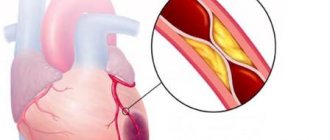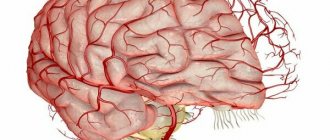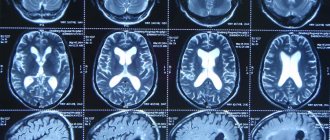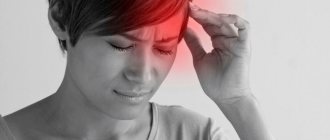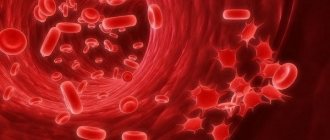If you experience a feeling of vomiting and feel dizzy, then this is a warning bell from the body, which indicates serious illness. Only a doctor can determine the cause of a pathogenic condition. Self-examination and self-medication will not lead to results. Treatment should be carried out using comprehensive measures.
Dizziness (vertigo syndrome) is a feeling during which a person feels that all objects are spinning around him.
Nausea is the stomach's desire to vomit.
What should be considered dizziness?
Dizziness
is one of the most common complaints among adult patients; most often they only complain of headache or back pain.
However, dizziness can mean completely different symptoms. Patients often call dizziness:
- darkening of the eyes
after a sudden change in position; - a veil before my eyes
; - presyncope (feeling of impending loss of consciousness). In this case, they usually complain of dizziness and weakness;
- imbalance
(instability and
staggering when walking
); - feeling of faintness
, a state reminiscent of intoxication. In this case, the complaint usually sounds like nausea and dizziness.
Such symptoms are certainly significant and may indicate various diseases (anemia, low blood pressure, vegetative-vascular dystonia, diseases of the cardiovascular and respiratory systems), but are not dizziness itself. True vertigo
(or
vertigo
) is a condition in which the patient has a feeling of rotation of actually stationary objects around him or, conversely, a false sensation of his own rotation or movement.
Quite often it is accompanied by nausea, vomiting, and increased sweating.
Providing assistance at home
If dizziness bothers you regularly, you need to contact a neurologist who will find out the cause of the problem and help eliminate it. Before visiting a doctor, you can try to get rid of dizziness during sleep using several traditional medicine methods. These include:
- light massage of the neck and scalp;
- performing regular breathing exercises for two minutes (to do this, place a hand on your stomach and begin breathing slowly through your mouth, while you need to inflate your stomach as much as possible when you inhale and draw it in when you exhale);
- pressing the center of the forehead with your fingertips for several seconds (about ten);
- ventilation of the apartment;
- getting rid of tight clothes (they should be unbuttoned or removed);
- Avoid sudden body movements, including sudden turns of the head. You need to take a vertical position carefully, without rushing.
Changing your lifestyle can significantly improve the patient’s condition and even cure dizziness. That is why experts advise normalizing your diet, following a daily routine (it is very important to distinguish between rest and sleep time), taking active walks in the fresh air for at least an hour every day, and conducting therapeutic exercises.
These measures have a therapeutic effect for any pathologies that provoke dizziness. Their regular adherence will help a person prevent the progression of the disease and reduce the symptoms of vertigo.
If, despite following all the advice of a specialist, the head continues to feel dizzy, leading to further deterioration of the patient’s condition, it is necessary to immediately call an ambulance.
Causes of dizziness
Control over the position of the body in space is ensured by the joint action of three anatomical systems of the body:
- vestibular. The vestibular apparatus is located deep in the skull and includes sensitive receptors that respond to the movement of the body in space;
- visual. The eyes provide basic information about our position in relation to objects in the world around us and the position of parts of our body in relation to each other.
- peripheral sensory receptors found in muscles, joints and bones, which also provide the brain with information about the position of various parts of the body.
Stimulation of one or more of these systems can lead to dizziness (as, for example, dizziness occurs as a result of riding on a merry-go-round). If dizziness appears without any external reason, then the nature of such dizziness is obviously pathological. Most often, the cause of true (or, as it is also called, systemic) dizziness is a violation of the vestibular apparatus.
Treatment of discomfort
There is no need to self-diagnose and try to determine why your head hurts and feels dizzy. Only the attending physician will be able to correctly determine the cause of the ailment and prescribe the correct treatment to the patient.
Therapy for the disease directly depends on the characteristics of its course. Dizziness cannot be treated on its own - in order to get rid of this unpleasant symptom, it is imperative to identify the main cause of its occurrence and eliminate it as soon as possible. Treatment of the disease may include both non-drug treatment methods and medications:
- Carrying out manual therapy. It is very important that such therapy is carried out only by a professional specialist, otherwise it will be difficult to avoid complications.
- Reflexology and physiotherapy. In reflexology, the doctor performs acupuncture, which is especially effective for certain types of pathologies.
- Application of the Shants splint.
- Health-improving physical education.
- Use of medications. Depending on the type of lesion, medications may be prescribed to improve brain function, strengthen the walls of blood vessels, etc.
In severe cases, the specialist prescribes therapy from several methods to the patient at once. This treatment allows you to get faster results in the fight against pathology.
The development of dizziness in a horizontal position may directly indicate the presence of a serious illness. Therefore, it is very important to consult a doctor at the initial stage of pathology and carry out a comprehensive diagnosis to find out its causes.
Self-medication in this case can lead to serious problems - the real disease will begin to progress noticeably, and the patient’s condition will only worsen.
Diseases that may cause dizziness
Most often, dizziness occurs with the following disorders:
- ear diseases
, first of all:- Benign paroxysmal positional vertigo (BPPV).
BPPV accounts for up to 80% of all cases of true dizziness. The name of this disease means that it does not pose a serious threat (therefore - benign), that attacks of dizziness occur suddenly (therefore - paroxysmal), that the attack begins when the position of the head changes - turning or tilting (therefore - positional). The cause of dizziness is the displacement of hard formations (otoliths) in the inner ear. Although BPPV may cause nausea and weakness, no other pathological changes are found on examination; - labyrinthitis
(inflammation of the inner ear); - Meniere's disease
(characterized by an increase in fluid in the cavity of the inner ear) - causes severe dizziness, accompanied by tinnitus, nausea, vomiting, and a feeling of fullness in the ear; may lead to hearing loss; - tumor (neurinoma) of the auditory nerve
; - barotrauma
– rupture of the eardrum due to a sudden change in pressure; - other ear diseases
- otitis media, eustachitis, cerumen plug;
, including:
migraine
(caused by disorders of the brain structures responsible for pain and other sensations) - dizziness during migraine is a harbinger of a painful attack;
;
;
- diseases of the cervical spine
(primarily
osteochondrosis
); - psychogenic dizziness
is not true dizziness (that is, it is not associated with pathology of the vestibular apparatus). Most often described as a feeling of unsteadiness, brain fog, fear of falling and passing out. Occurs as a reaction to stress, usually accompanied by other psychogenic symptoms; - some other diseases.
Mechanism of development of vertigo
If we consider dizziness from an anatomical point of view, the causes of this condition are quite simple. The vestibular apparatus, responsible for human balance and coordination in space, is located in the inner ear. Vision and muscle reflexes help a person navigate the environment. All received information enters the brain. And it is he who controls the functioning of the vestibular apparatus.
Sometimes the connection between the inner ear and the brain can become disrupted. A person loses the ability to navigate in space. Dizziness appears. To restore the lost connection, the brain immediately launches several reactions at once. Some of them may affect neighboring centers (for example, emetic). This leads to the appearance of unpleasant accompanying symptoms.
Dizziness and weakness
Dizziness and weakness can occur in many cases. This condition does not always mean that you are sick. Thus, in adolescence, weakness and dizziness are explained by hormonal changes. The autonomic nervous system is being rebuilt and growth rates are accelerating. Against this background, weakness, dizziness and even fainting are possible. Also, dizziness and weakness are typical during pregnancy.
If the cases mentioned do not apply to you, dizziness and accompanying weakness most likely indicate some kind of pathology. Weakness and dizziness are most often observed with:
- anemia (low hemoglobin content in the blood);
- cerebrovascular accident. In this case, tinnitus, decreased attention, and the appearance of black spots before the eyes may also occur;
- a sharp increase in blood pressure (hypertensive crisis). In this case, dizziness and weakness may be accompanied by a headache;
- neurocirculatory dystonia;
- oncological diseases.
Carrying out therapeutic exercises
To protect yourself from dizziness and increase the body's resistance to disease, you should perform some sets of exercises:
- Close your eyes and try to draw a circle with them. Sessions last for several minutes before going to bed and after waking up. The exercise is performed while lying on your back.
- Smooth movements of the head from side to side for several minutes help strengthen the vestibular system and prevent feelings of nausea.
- Pressing your fingers on the eyes helps eliminate vomiting and vertigo.
Dizziness while lying down can occur at different ages. Since this ailment can be provoked by various reasons, the patient needs to seek help from an experienced specialist as quickly as possible, who will carry out the necessary diagnostics and prescribe treatment.
ONLINE REGISTRATION at the DIANA clinic
You can sign up by calling the toll-free phone number 8-800-707-15-60 or filling out the contact form. In this case, we will contact you ourselves.
Neurovascular conflict
In neurovascular conflict, episodes of dizziness are caused by compression of the 8th pair of cranial nerves by an abnormally located blood vessel. As a result, the myelin sheath of the nerve becomes thinner, which leads to its constant stimulation by the vessel and overexcitation of the vestibular nucleus.
This is accompanied by short attacks of dizziness, which usually occur with a certain position of the head. This is often associated with tinnitus and hearing loss. In this case, episodes of dizziness can bother the patient several times a year, or 2-3 times a day.
For frequent, severe attacks, patients are prescribed specific drug treatment. If in response to it there is a decrease in the number of attacks, a decrease in their severity and duration, this serves as additional confirmation of the presence of a neurovascular conflict. In such situations, MRI is highly recommended. If its results confirm the diagnosis, it is worth performing surgery to decompress the vestibular-cochlear nerve as early as possible before hyperactivity of the vestibular nucleus develops.
Principles of therapy
Since dizziness is not considered an independent disease, the choice of the correct treatment tactics is determined by the specific cause that caused the symptom. As a rule, a timely diagnosis allows dizziness to be completely eliminated or the condition to be prevented from worsening. The key to success in this case will be a timely and accurate diagnosis, taking into account the individual characteristics of the patient’s body, selecting the right treatment program with the prescription of effective medications.
Popular medications on the topic
Cerebrolysin Cerebrolysate
For more information about the causes of dizziness, watch the video:
Diagnosis and treatment of dizziness is a difficult task even for an experienced doctor. In every case of a painful, prolonged or sudden attack, consultation with a specialist is required. Only he will determine what the patient should do next, what consultations and examinations she needs.
This article has been verified by a current qualified physician, Victoria Druzhikina, and can be considered a reliable source of information for site users.
Bibliography
1. https://kiberis.ru/?p=50203 2. https://nikio.ru/docs/02-golovokruzhenie1.pdf 3. https://docs.cntd.ru/document/901918942
Assess how much it was useful article
4.4 141 people voted, average rating 4.4
Did you like the article? Save it to your wall so you don’t lose it!
Why are you girls...?
Let us also highlight the causes of dizziness, which the fair sex provokes with their unreasonable attitude towards their own body, and ultimately – towards their health:
- Constant dieting or a sudden transition to a strict diet. The head then begins to simply feel dizzy from hunger. Weakness and thinness accompany such lovers of slimness. It happens that overweight girls and women do not plan to become “prisoners of Auschwitz”, but only want to lose weight to a normal size, but they may not calculate the body’s capabilities, and it actively signals hunger with dizziness and resists the new low-calorie regime.
- Wearing tight clothes, corsets. In past centuries, women often fainted because most ladies wore corsets. Today, real corsets are not so common, but they are made to order. Craftswomen are proud that their clients are tightened... by a couple of tens of centimeters! No wonder this makes some people dizzy. There are also all kinds of shapewear. Safe when worn according to manufacturer's recommendations. But some people get carried away and squeeze into something that is not the right size. The result is that blood circulation is impaired and you feel dizzy.
I pulled myself into a corset and felt dizzy.
Also problems
And there are, although not one hundred percent female causes of dizziness, but it is the fair sex who are more susceptible to them.
- Vegetovascular dystonia. The diagnosis that doctors in the post-Soviet space like to make. Equates to: it’s unclear why you’re feeling dizzy. Often you just need to “dig deeper” and then the problems recognized by the World Health Organization will come to light. The same hormonal imbalance, for example. For women, this is fraught with infertility.
- Psychological problems. Women in the modern world are equal to men, but... sometimes they take on more than they can, but still worry strongly like women. Some may experience very real health problems. Girls, believe me, it's not worth it!
Diagnostics
The doctor clarifies all the symptoms, their frequency, asks about your diet and sleep patterns, and how often you are in stressful situations. Asks about head, hearing, and vision injuries; do you take vitamins and medications, drink alcohol, and about the pace of life.
After all clarifications, the doctor refers to:
- blood analysis;
- echocardiography;
- electrocardiography;
- CT (computed tomography);
- MRI of the brain (magnetic resonance imaging);
- radiography;
- vestibulometry;
- audiography;
- electroencephalogram;
- Ultrasound.

